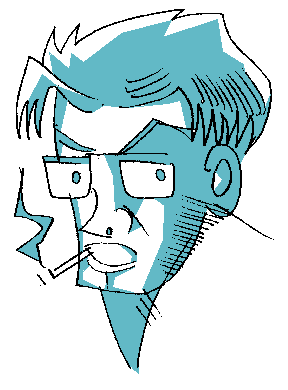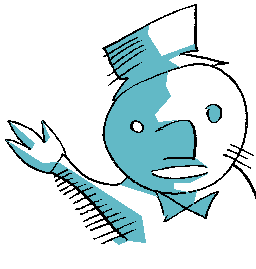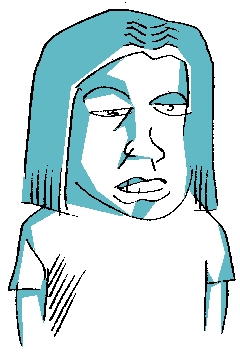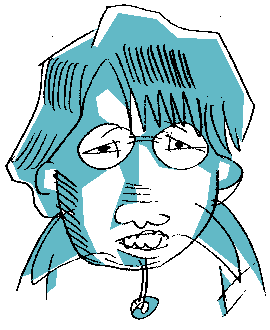Daniel Clowes
"...alternative comics' über-nerd and father to a motley cast of characters that roams, embittered and abused, through the worst of all possible pen-and-ink worlds." -Neva Chonin
Daniel Clowes is author of Lloydd Llewellyn and currently Eightball, published at Fantagraphics. Lloydd Llewellyn started in 1985 and was a comic about a detective and his friend, living in the 50's or something, and the whole comic has a 50's appeal. Clowes then started Eightball in 1989, which isn't about a certain single theme, though there's one continuing story. The first continuing story was Like a Velvet Glove Cast in Iron (1-10), a dreamlike mystery. A newer continuing story is called Ghostworld (11-18), about 2 girls and their everyday life. Some other characters pop up now and then, most notably comic creator Dan Pussey. There's also still some Lloyd Llewellyn stories, though they don't have much in common with the old Lloyd.
Daniel Clowes
Daniel Gillespie Clowes was born April 14th 1961 in Chicago. His parents divorced and so he was raised partly by his mother, then grand-parents ("My grandparents had this great house where nothing was bought after 1953, so it was like I grew up in the postwar era") in a liberal surrounding. He later had unlimited access to the comic and magazines of his older brother and media-junkie James. In school he was kind of a rebellic loner. In 1979, Daniel Clowes is finished with High School and he goes to New York, Pratt Institute in Brooklyn. His older interest for comics, like MAD and EC-Comics, is renewed with publications such as RAW, Weirdo, Love & Rockets. In 1984 he works for Cracked and finally gets called by Fantagraphics' Gary Groth. He then starts out with his comic Lloyd Llewellyn, and later Eightball. He moved back to Chicago, lived in Berkeley ("I tend to move every four or five years to a different major metropolis in America."), and is now home wherever his second wife Erika is.
(source: german "Reddition" #21, "Schnauze" XXL, various).
Lloyd Llewellyn

The stories were usually about some weird thing that happens to Lloyd along the lines of "Aliens! Murderers! Beatniks! Robots!", ending with a plot-twist surprise. The comic made it to 6 (black and white) issues. The cast of characters: The two main protagonists are Lloyd Llewellyn and buddy Ernie Hoyle, which is a hero/ sidekick combo. And then there's Police Seargeant "Red" Hoerring. The focus however is not one on the characters, which mostly are shamelessly misused to construct about any weird story imaginable. The short stories work as satire on old trash movies and comics, with every monster clichee a paranoid country establishes, and snappy phrases, but the plot level alone is always very entertaining. The artwork is more 50's geometrical then Eightball, very cold and static especially in the earliest issues, which artwork is stylish but not as great and routinious as it will get. The last issues story "The Nightmare" has Lloyd moving through time into later decades, and it shows a glimpse of the social commentary that we'll later have in Eightball. The LLoyd Llewellyn collection is published as "The Manly World of Lloyd Llewellyn".
"...And who knows... somewhere along that lonesome road we might see a new LLLL mag with a brand new format so dazzling, so breathtaking, so monumentally fantastic that I haven't even thought of it yet!"
Eightball
Like a Velvet Glove Cast in Iron

"Like a Velvet Glove Cast in Iron" is the title of a movie the main protagonist Clay Loudermilk watches at the beginning of the story. In this pervert and weird movie he recognizes the face of an old lost love. Clay sets out to discover what's behind this movie and the woman, as he stumbles through a surreal world full of lethargic bizarre characters. It was compared to the imagery of David Lynch (Blue Velvet, Twin Peaks), but if it has to be compared with something then Clowes thinks of it more as a surreal novel or a movie by Bunuel. Slowly, a master conspiracy seems to be revolving around an iconized face called Mr. Jones that can be found in many places since the beginning of the century ("It's the symbol of a certain, particular type of a person that has been with us for a very long time... it's the link between certain people, certain organizations...").
There was a "Like a Velvet.." Soundtrack by Victor Banana.
Ghostworld

Ghostworld (the title is "from a piece of graffiti on
a Chicago garage", Neva Chonin), drawn black and white with a
shade of blue, is an ongoing story that followed "Like
a Velvet.." in Eightball. It might be Clowes' most
serious attempt to show real characters instead of stand-up's to
illustrate his essays.
It's focussed on two teenage girls/ young women
("Burdened with faux sophistication and teenage angst" - Barry Lyga)
and their everyday life, hanging
out in a creepy small town. The one girl is 18-year old Enid Coleslaw, the other
one is beautiful blond Rebecca "Becky" Doppelmeyer. Both of the girls are looking
for and constantly redefining their identity in a world full of loosers, freaks, perverts
and wanna-be's, big-ass corporate fucks, drags, idiots, pedophiles, satanists...
"Eww! Look at that creepy guy... that's the worst!
That's obviously a serial killer!"
They are both concerned with issues of style and how an individuum
can still be hip and special in a consumist world which integrates even it's
outsiders. Enid, who's even more lost and alone then her friend, comments:
"Y'know, John Ellis thinks he's so 'out there' with that stupid Mayhem Magazine of his, but really he's just interested in the same shit the rest of America is interested in."
The rest of America, that obviously exludes the two girls and shows how
both share a general cultural pessimism and hatred towards the society they
feel alienated by. What they might even hate more is the chance that in the
end, they are not so different from the rest, and so Enid seems to be
afraid to be understood, labeled, and then targeted by someone, and
in order to avoid that she tries to be a moving target.
Enid says: "Anybody (...) could see that I wasn't dressed like some
modern hardcore asshole... it was like an old punk
look... (...) I wish I could just come up with one perfect look
and stick with it..."
Enid though is the one who also hates herself, she's sexually frustrated and a bit envious on her friend. She's also a bit in love with her as it seems. Becky calls her a Man-Hater, and Enid remarks sarcastically, laying her arm around her, "Maybe we should be lesbos!"
Dan Pussey

This is a portrait of the ultimate creep, Daniel Peter Pussey (1961-2029, incidentally), whose only strength lies in creating super-heroes comics. Inside that story we got a radical satire directed at the US comic industry, and no one is spared. Besides the mainstream we have Art Spiegelman as greedy Gummo Bubbleman, Gary Groth as Mr. Anger, Fantagraphics is Highbrow Comics, Eightball is Nercball, and so on...
The origins of Pussey's ("I think of him as pronouncing it 'poo-say' but others
would all say 'pussy'")
super-hero interest are rooted in the loneliness
of his childhood and youth. Pussey's the world's ultimate outsider totally
surrounded by a dreamworld in which he is seeking revenge and trying to
crush everyone like "puny ants", his duty is to "exterminate". In his
fantasies he's not only super-powerful, he's also very beautiful, though
he can't even get his sex-dream life right. When his parents find a porn
magazine that Dan hid, they are paradoxically happy (he's at least
not gay). Pussey puts down his power fantasies on paper drawing super-heroes,
"imitating people who imitated other artists who imitated other artists"
and eventually gets famous...
The complete story of the rise and fall of Dan Pussey, and the whole
take on comics and their value, is sad and funny at the same time.
(Quotation source: Interview by Noel)
For more information on Daniel Clowes, see: Daniel Clowes Bibliography, Daniel Clowes at Fantagraphics.



